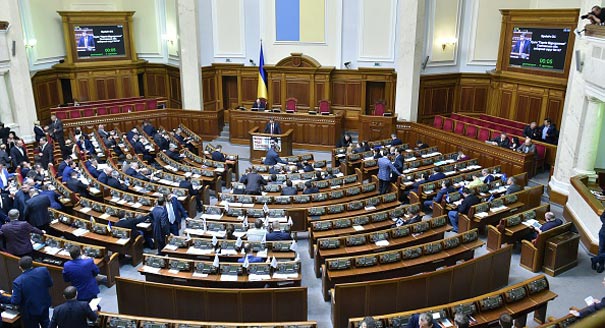Ukraine’s anticorruption efforts are about to move up a gear. Today, October 31, is the deadline for state officials, including members of parliament, ministers, and judges, to upload detailed information about their private assets onto a new open-access database. From its conception and legal basis to the technical development in cooperation with the UN Development Program and the Danish government, Ukraine’s e-declaration system has progressed in a stop-and-go fashion.
The launch date for the system had been postponed several times due to political pressure, technical glitches, hacking attacks, and a missing certification that the software could handle private data. Nevertheless, the system went live on September 1, 2016, under the auspices of Ukraine’s National Agency on Corruption Prevention (NACP), one of the new institutions created to fight corruption.
Subsequently, Ukrainian Prime Minister Volodymyr Groysman set a deadline of the end of October for complying with the new system. He repeatedly encouraged his colleagues to declare their assets. Many of them remain skeptical and waited until the last moment to register their assets.
The idea behind e-declaration originated with attempts after the 2013–2014 Euromaidan antigovernment protests to define a coherent anticorruption strategy for Ukraine. The EU included a functioning e-declaration system in a list of conditions for visa-free travel to the EU for Ukrainians. In September, the EU had criticized the delay in the launch of e-declaration and the lack of initial certification for the handling of private information. But now, Ukraine has taken one further step toward meeting the conditions for visa-free travel.
Asset declaration is an important part of corruption prevention and conflict-of-interest systems, both of which are anchored in the UN Convention Against Corruption. The anticorruption watchdog Transparency International has demonstrated that countries with publicly disclosed data on private assets have generally lower levels of corruption. According to the World Bank, eight out of ten high-income countries allow public access to civil servants’ asset declarations.
Many countries, for example two-thirds of G20 nations, have obligatory declaration systems in place, but Ukraine is now a rare example of a country that provides general public access to this information in the form of an easily searchable database. In 2012, 43 percent of 176 jurisdictions analyzed by the World Bank had open access to some data, but often only in the form of a summary report published in an official government gazette. The Baltic states, which introduced their systems in the mid-1990s, follow this model. Among the countries with open access are the UK and Romania.
Moreover, the number of officials and civil servants obliged by Ukrainian law to record their assets electronically is exceptionally high. Comparative experience shows that eventually, the number might have to be reduced to keep the system effective.
The civil society umbrella organization Reanimation Package of Reforms, which prepares detailed policy proposals and monitors the legal parameters of policy implementation in Ukraine, has prepared a list of the remaining inconsistencies between the current e-declaration system and its legal basis. The organization fears that the remaining discrepancies will disqualify the new system from being used as an admissible source of information for legal proceedings.
Tens of thousands of officials have already entered information on the system, but attention will initially be on a handful of individuals. Ukrainian President Petro Poroshenko had repeatedly criticized aspects of e-declaration but submitted his declaration in the end, providing a clearer image of his wealth and the international spread of his assets. On October 30, the site could be accessed only intermittently—there was speculation about hacking, but the sheer volume of traffic is an equally plausible explanation. At first glance, the amount of cash that a wide range of officials beyond top oligarchs store at home is particularly staggering and a powerful verdict on the elite’s trust in national banks.
The implementation of the e-declarations has been hampered by political opposition, technical issues, and legal inconsistencies. The rollout is likely to be incomplete and inaccurate in parts, but the sheer existence of this kind of system is a significant step change in Ukrainian politics. It sends an important signal about the scope of Ukraine’s anticorruption policy. So far, the emphasis has been on creating new institutional building blocks in the fight against corruption—namely NACP, tasked with developing anticorruption policy and monitoring individuals based on their e-declarations, and the National Anti-Corruption Bureau, which is meant to investigate cases of false entries in the system. The new institutions still have to find their modus operandi, especially vis-à-vis the Prosecutor General’s Office and existing courts, to see cases through to prosecution.
By comparison, providing open access to information about the assets of public officials on such a large scale introduces an unprecedented element of transparency and accountability not only into the practice of Ukrainian politics but also into the mind-sets of Ukrainian citizens. Many Ukrainian officials are wary of or opposed to e-declaration, making it likely that they will try to sabotage the system. But the pendulum has swung too far in one direction to question the underlying principle. It is hard to overestimate the importance of this step.
Gwendolyn Sasse is a nonresident associate at Carnegie Europe and director of the Center for East European and International Studies in Berlin.








